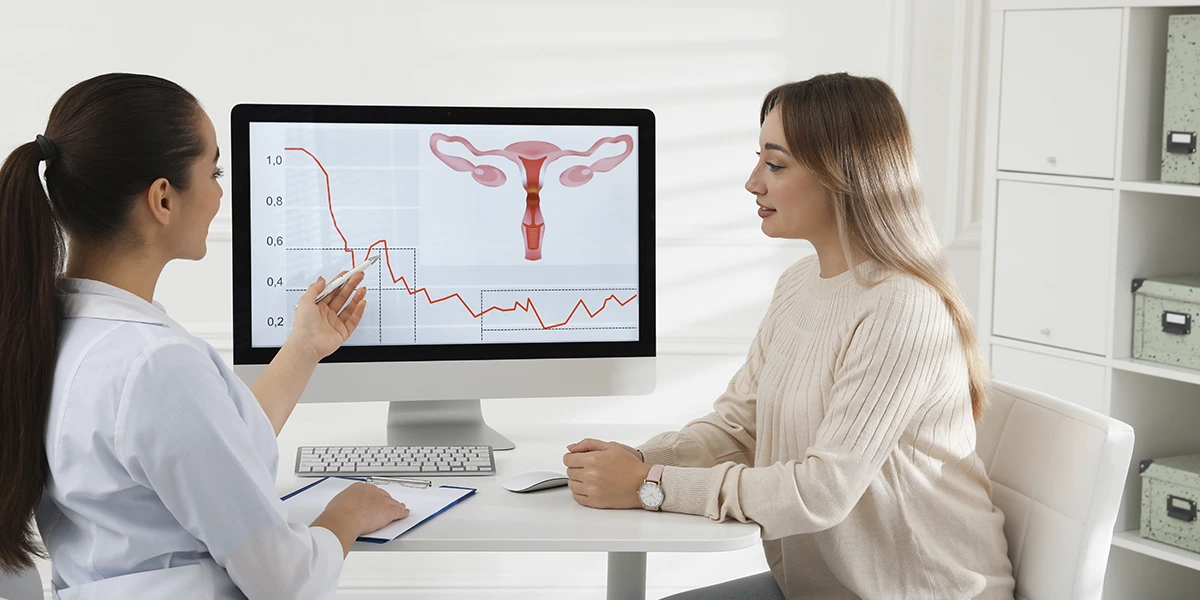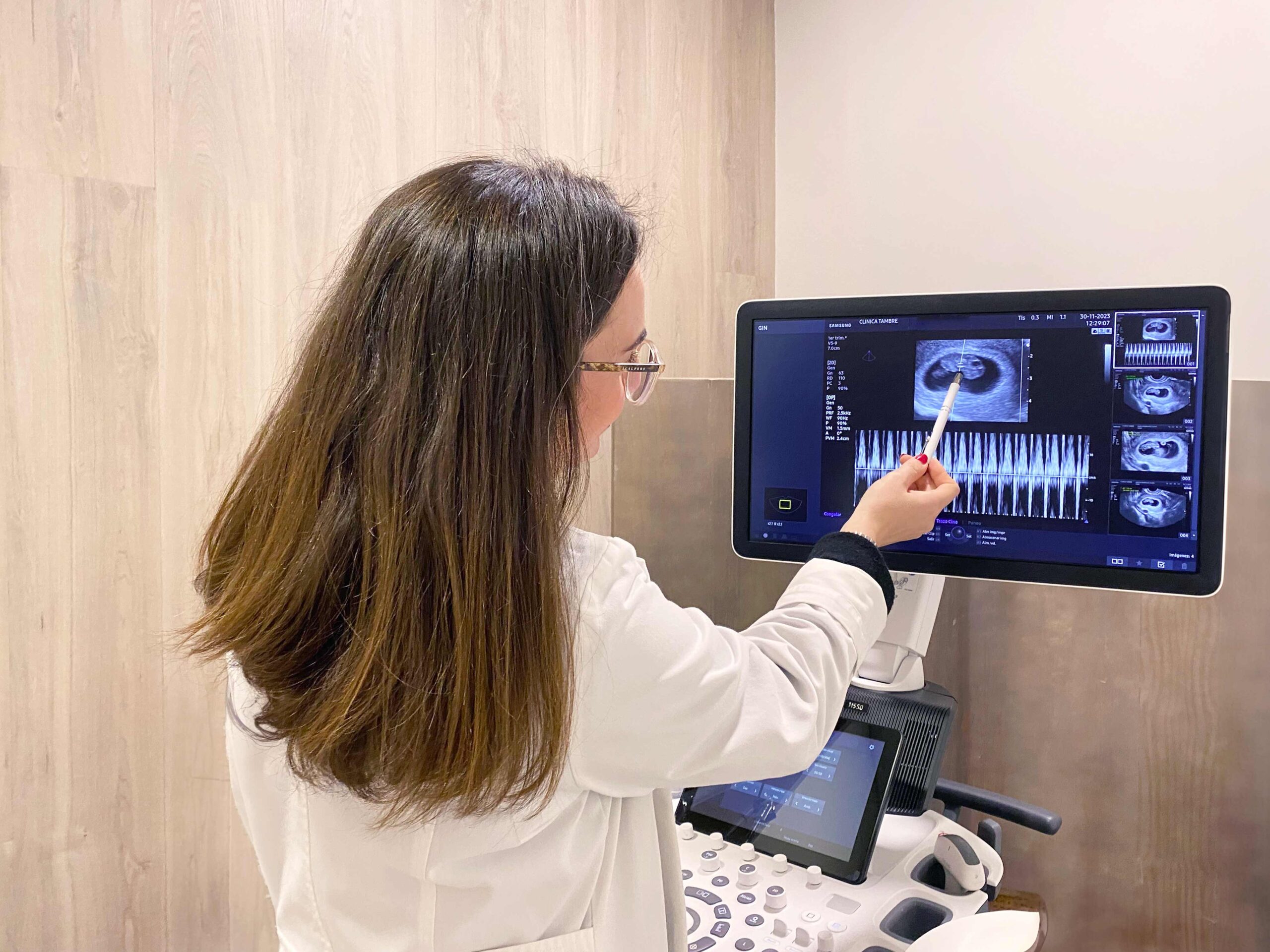blog tambre
Becoming a Mother with Low Ovarian Reserve

Table of contents
Low ovarian reserve is one of the most frequent causes of female infertility. About 10-15% of women suffer from it.
Nowadays, a diagnosis of low ovarian reserve does not mean that you have to give up your dream of being a mother. With the help of science it is still possible to make it a reality. Through this article, we will examine your options to make this happen, however, the most important thing is that you do not wait more time and contact a specialist in assisted reproduction at your earliest convenience, because when it comes to low ovarian reserve, every minute counts.
Tambre is an Advanced Reproductive Medicine clinic in Madrid (Spain) that employs the most innovative treatments to address low ovarian reserve. We work with cutting-edge technology and our team of specialists are committed to offering you personalized treatments for low ovarian reserve to increase your chances of achieving pregnancy. We are specialists in complex cases and low ovarian reserve is one of the challenges we face every day.
In addition, our specialists speak English, so you can carry out the entire process in your own language, comfortably and confident that there will not be any communication issues between you and the team. Moreover, you will be always attended by the same doctor and nurse.
What is ovarian reserve?
Ovarian reserve is the number of eggs a woman has in her ovaries. When a woman is diagnosed with low ovarian reserve, it means that she has fewer eggs than would be expected based on her age, and often these eggs are of lower quality. This situation can directly affect fertility, meaning that getting pregnant becomes more difficult, especially as you get older.
At birth, women have a certain number of eggs that decreases over time. Throughout a woman’s life, dozens of oocytes are lost every month. The best eggs are those that are released when the woman is 20 to 30 years old. The natural decrease in the quality and quantity of eggs occurs as the years go by, and this drop begins to be more pronounced after the age of 35.
In some cases, the decrease of eggs may be earlier or more pronounced than normal, so there are women in their 30s who have low ovarian reserve, or suffer from early menopause, thus reducing their chances of motherhood.
Causes of low ovarian reserve
Age is the most common cause of low ovarian reserve. Nowadays, it is a social reality that women decide to postpone motherhood until later in life. At older ages, women have fewer eggs and these are of poorer quality.
There are other causes that may be behind a low ovarian reserve, such as genetic factors; medical treatments such as radiotherapy or chemotherapy; previous ovarian surgeries; endometriosis; and even stress and smoking, which cause the cell aging.
How do I know if I have low ovarian reserve?
Women with low ovarian reserve are usually asymptomatic. In some cases, irregularities in the menstrual cycle or shorter cycles (instead of 28 days, 24 or 26 days between cycles) may be experienced. However, difficulties in conceiving are the main reason why women with low ovarian reserve seek medical attention and receive this diagnosis.
A diagnosis can also be determined if there is a family history of low ovarian reserve or if the woman has experienced previous complications such as ovarian cysts or autoimmune disease. Confirmation of low ovarian reserve is carried out through laboratory tests and an evaluation of the patient’s medical history. Some of the diagnostic tests we perform at Tambre are:
1. Anti-Müllerian Hormone (AMH)
AMH is a hormone produced by ovarian follicles and its level in the blood provides an indication of the number of eggs left in the ovaries. The greater the presence of anti-Müllerian hormone in the blood, the greater the available ovarian reserve. This is one of the most important tests to evaluate ovarian reserve as it is very reliable and can be performed at any time during the menstrual cycle.
2. Hormonal tests
A blood test performed between days 2 and 4 of the cycle allows us to measure the levels of key hormones:
- Follicle-stimulating hormone (FSH): is a pituitary hormone (released by a part of the woman’s brain) which is responsible for stimulating the growth of follicles. Therefore, when there is low ovarian reserve, the level of this hormone increases to try to activate the ovary – put simply, the brain has tell the ovaries to work harder.
- Estradiol: is released by the active follicle(s).
- Luteinizing hormone (LH): also known as luteostimulating hormone, is responsible for recruiting follicles and triggering ovulation. When the follicles are mature and estrogen levels are very high, the so-called LH surge occurs, which leads to the expulsion of the egg. Abnormally high values can point to different disorders and indicate problems in ovarian reserve.
3. Antral follicle count
Antral follicles are small fluid-filled sacs found in the ovaries. Each antral follicle contains an egg that has the potential to mature during the menstrual cycle.
During the cycle, several antral follicles begin to grow in the ovaries. Generally, the best of them will be the one that matures, ovulates during that cycle and waits in the tubes to be fertilized. The remaining antral follicles, despite not reaching ovulation, will offer an indication of the number of eggs present in the ovaries at any given time.
Through a transvaginal ultrasound, we can count the number of antral follicles present in the ovaries. This count, along with the rest of the tests, help us evaluate a woman’s ovarian reserve and her potential ability to conceive.
4. Menstrual history and menstrual cycle evaluation.
The Gynecologist will also review your medical and menstrual history to obtain information about the regularity of your menstrual cycles, any previous ovarian surgery, family history and other relevant factors.
Personalized treatments for women with low ovarian reserve
In vitro fertilisation (IVF)
IVF is one of the main treatments for patients with low ovarian reserve, although in younger patients it is possible to consider artificial insemination (AI), as long as the fallopian tubes function properly and we do not notice a totally depleted ovarian reserve.
At Tambre we carry out personalized treatments for women with low ovarian reserve, based on the individual evaluation of each patient and their specific circumstances. Therefore, a comprehensive investigation of the potential causes of low ovarian reserve is important.
In the case of IVF, we perform a controlled and personalized ovarian stimulation in order to obtain the best possible results. In certain circumstances we can perform a double stimulation, in order to obtain the highest number of oocytes/embryos.
Once the embryo has been generated in our IVF laboratory, we take care of each embryo individually. This begins with the highest quality growing medium and adequate conditions of temperature, air quality and light. At Tambre, we also provide the best possible resources to control its development, with a 24h monitoring system, the time-lapse GERI Incubator.
This innovative embryo incubator allows us to continuously monitor the development of the embryos, and our results support its effectiveness, as implantation and pregnancy rates increase. Thanks to the images that are taken of embryonic development every 5 minutes, it is not necessary to remove the embryo for observation and our specialists can make informed decisions in real time, adapting the treatment in a precise and efficient manner.
A fundamental phase in this process is the preparation of the future mother. For this purpose, we prepare the patient’s endometrium so that it acquires the appropriate thickness, so that the embryo can be implanted ensuring that the pregnancy progresses as much as possible.
Egg donation
When IVF has not been effective or in the most severe cases of low ovarian reserve, IVF treatment with egg donation is the most effective treatment. This is particularly so in those patients older than 42-43 years, who have low quality eggs and a depleted ovarian reserve. It is one of the most advanced treatments and currently most in demand because it allows motherhood to women who cannot, or have little chance, of becoming mothers with their own eggs. Among its advantages are its high success rates. The eggs come from young women, under 35 years old, who have donated them, helping other women fulfil their desire to be mothers.
At Tambre, we offer the assurance that the process is completely exhaustive and safe.
Ovarian rejuvenation
There also ovarian reactivation techniques that seek to improve egg retrieval and recover menstrual cycles in women with low reserve. They have proven especially beneficial in young patients who still have menstrual cycles. Among them is the administration of the patient’s own platelet-rich plasma (PRP) to the ovary, which can help recover follicles in an early phase that could not be obtained otherwise. It must be stated however, that scientific evidence on its effectiveness is still very limited and more clinical studies are needed to show its efficacy.
What to expect from your visit to Tambre
If you do not live in Spain, your first assisted reproduction consultation can be conducted online. Initially, our coordinator will assist with administrative matters and consents. Subsequently, a Gynaecologist who speaks your language will consider your case in a consultation which last for approximately one hour.
For the initial, online consultation, fertility tests typically done at our clinic, can be performed in your country and sent to Tambre. Alternatively, you can choose to visit our clinic later to meet your bilingual team and see the facilities. We recommend that patients travel to Madrid for their first consultation to expedite tests and treatment. During your visit, we will conduct the necessary tests and consultations with the gynaecologist promptly, ideally on a Friday or Monday which allows the possibility of taking time out to view beautiful Madrid. A follow-up online appointment will then be scheduled to discuss results and potential treatments.
Consultation with the best specialists
If you have been diagnosed with low ovarian reserve and have undergone IVF treatment at another clinic without success, or are simply worried because pregnancy has been delayed, contact us and make your first appointment now. You can call us +44 (0) 20 38 688 650.


